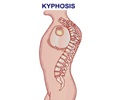More than 2,000 people are being recruited from Orkney, Scotland as a part of a major new study that wants to identify genes that cause osteoporosis.
More than 2,000 people are being recruited from Orkney, Scotland as a part of a major new study that wants to identify genes that cause osteoporosis. The study is to be funded by Arthritis Research Campaign and people from Westray, Sanday, Stronsay and Shapinsay, as well as those from the west of the Mainland of Orkney are expected to act as volunteers. The study may cost £240,000 over the next three years.
The investigation will be carried out by a team of researchers from the University of Edinburgh led by Professor of Rheumatology Stuart Ralston, and Royal Society Research Fellow, Dr Jim Wilson, who comes from Orkney.Previous research has shown that people with a family history of osteoporosis are at increased risk of suffering from the condition themselves. This appears to be due to the inheritance of genes that predispose them to reduced bone mineral density.
The people of Orkney have been specifically selected by the Edinburgh team because the population is both isolated and stable, and specific genes will be easier to track down and identify.
"Although some genes that predispose people to osteoporosis have been identified, most remain to be discovered," explained Professor Ralston, who is based at the Rheumatic Diseases Unit in the university's Molecular Medicine Centre at the Western General Hospital. "With this project we will carry out genetic mapping studies in several large families from an isolated population in Orkney to try and discover the location and identify the genes that influence bone density and predispose to this common condition. We know that genetic factors make about an 80 per cent contribution to people developing low bone density, but we only know about five per cent of them."
"You couldn't do this sort of study in a large city like Edinburgh because there are people from all over the world and therefore too many genetic influences, so it would be very hard to disentangle those that are involved in predisposition to osteoporosis," said Dr Wilson, from the MRC Human Genetics Unit at the Western General.
"If 100 people in a big city had osteoporosis there might be 100 different reasons why they had it, many of which would be genetic. But on a small island there would be many fewer genetic reasons, which would make each one easier to identify."
Advertisement
The new study will piggyback on an existing research project in Orkney (ORCADES) which has involved 1, 400 volunteers and is looking at genetic influences on cardiovascular disease.
Advertisement
Recruits will have their bone mineral density tested on a DEXA (Dual Energy X-ray Bone Densitometer) machine, and if they are found to have thin bones will be offered appropriate treatment via their GP. They will also have blood samples taken, and a genome wide scan carried out on their DNA in laboratories in Edinburgh.
Professor Ralston said he and the rest of the team were confident that new genes that predispose people to osteoporosis would be found during the course of the project.
"If our studies are successful, the results will be of value in developing genetic tests with which to assess the risk of fractures occurring, and new drugs that can be used for the prevention and treatment of osteoporosis," he added.
Recruitment will start this month. Source: Eurekalert











